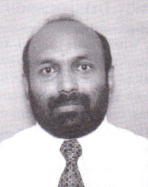
by Ajita Kadirgamar
ISOCOR is a California-based corporation that has become a leading international provider of state-of-the-art Messaging Solutions. They specialise in high-end servers that provide the fastest message switching in the world; gateways between incompatible mail systems, on-line directory services and easy-to-use, intuitive desktop products.
The company which was formed in 1991, showed a skyrocketing increase in revenue from US 8 743,000 in 1992 to US 8 1.2 million in 1994. This outstanding achievement ranked ISOCOR as the fastest growing private company in Los Angeles County over that two year period.

Why should we be interested in this company and its success? Perhaps because one of its founders and Vice President Engineering is a Sri Lankan, Raomal Perera. Raomal, a product of St. Joseph’s College, Colombo went on to obtain his B.Sc. in Electronics Engineering from the University College of Swansea, UK. His early experience in electronics and software engineering included a stint at British Leyland Systems UK, and with CPT, an American company dealing with word processing software. It was here that he first became interested in messaging. In 1991, Raomal was one of the three people invited by Andy De Mari, President of ISOCOR, to set up the company. In an unusual move for an American company, the engineering base of ISOCOR was located in Dublin, Ireland with Raomal heading the 130-member operation.
So what is messaging all about? In general, it defines any means of conveying a message; in IT terminology it signifies the convergence of E-mail, digital data, voice, fax and video. In other words, it is the basis for Electronic Information Exchange, providing rapid and reliable delivery of key business documents.
Messaging is important because businesses need to communicate. The competitive advantage of messaging can be seen in the speed of response to customer and supplier, speed of internal reaction to events and commercial information in a common format resulting in less time devoted to entering and re-entering data. A person should be able to interact via messaging with any other person in the world, provided they have some form of computer and access to a communications link. Rather than being impeded by issues such as the make of the computer or operating system in use by the recipient, the communication should be as straight forward as using the phone. For this reason, Electronic Information Exchange must be based on international data communications standards rather than proprietary solutions that depend on a single vendor.

Raomal was in Sri Lanka in August to conduct a seminar on “Messaging Systems and Applications”, aimed at putting this technology in context and describing its real world applications. An example of this system is how Raomal used messaging to get a seminar presentation beamed from Ireland to his brother’s computer in Colombo within a matter of minutes!

Raomal was keen on organising something in his native country because he feels there is a great opportunity for messaging in this fairly young market. Asked about the potential for a software development industry in Sri Lanka, he says yes, but it would need government assistance. He cites the examples of India where they have set up mini Silicon Valleys and Ireland where there is an industrial development authority that tries to attract leading companies to start software development in their country. “The government (of Sri Lanka) would have to assist by providing resources and promoting and attracting foreign business. The standard of education here is high and that is a key factor in software development”, reiterates Raomal.
On the future of messaging Raomal says, “people didn’t believe the telephone would take off, and today you can’t live without it. In the same way the fax is indispensible. Soon companies won’t be able to live without messaging. You begin to rely on messaging and getting the information. Companies that are quick to implement messaging will have that competitive edge”. Raomal is also director of several ISOCOR subsidiary companies. He attributes his success and rise to seniority, like many do, to being in the right place at the right time. But maybe some of that famed Irish luck rubbed off on him too. At any rate, here is another son of Sri Lankan soil we can be proud of, as he plays his part in the communications revolution the world is currently witnessing.


